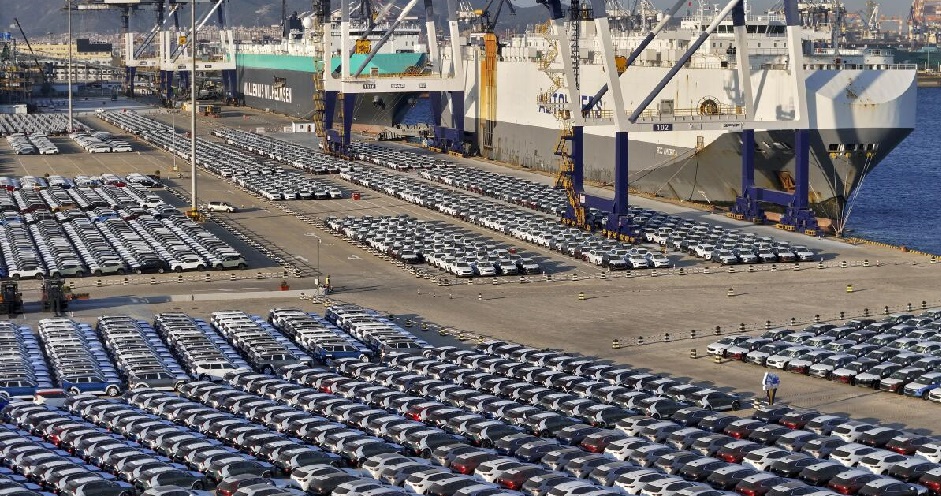Currently, the European Commission is investigating potential subsidies to Chinese electric vehicle (EV) manufacturers, prompting China to threaten a 25 per cent tariff on European cars in retaliation.
Although none of these actions are confirmed yet, as their implementation will be determined in June, it could be detrimental to Germany and Slovakia.
Why specifically for these two countries?
Mainly because, according to Bloomberg, the stocks of local car manufacturers such as Volkswagen Group, Mercedes-Benz Group AG, and BMW AG fell by over two per cent in early trading this year.

The majority of imported cars belong to the luxury segment, with brands like Porsche, Audi, and Range Rover ranking among the top ten in 2023.
Models with larger engines, such as the Mercedes GLE SUV and S-Class sedan, as well as the Porsche Cayenne SUV, could also be affected if a new tariff is implemented.
Last year, Lexus, Toyota’s brand, led imports with 180,000 sales, representing over a fifth of the total.
If China decides to impose the tariff on all nations, the Japanese company could be a collateral victim in the trade dispute with the European Union (EU) and the United States (U.S.).
In addition to the impact on the car trade, the Asian giant has hinted at retaliatory taxes on European alcoholic beverages and dairy products and has initiated an investigation into European brandy exports.
Therefore, the Slovak Electric Vehicle Association (SEVA) expresses discontent with the potential actions Ursula von der Leyen could take, stating that “anti-subsidy measures would not address the competitiveness of the European automotive industry against new Chinese car manufacturers.”
“In addition, European automakers could lose the Chinese market, the largest in the world, in a possible trade war,” they continue in their LinkedIn post.
Cars account for over 40 per cent of Slovakia’s exports and indirectly employ over 250,000 people or ten percent of citizens.
In fact, in 2023, Slovakia exported 2.36 billion euros to the “Dragon Land”, according to Patrik Krizansky, the association’s Director.

Consequently, Krizansky publicly states: “In discussions about imposing tariffs on Asian electric car imports, we, as a country, must stand on the side of those who reject such interventions in the economy.”
Therefore, he clarifies the common agreement with German executives: “German Chancellor Scholz and Swedish Prime Minister Kristersson have recently spoken out against the introduction of the target.”
Likewise, these tariffs are also rejected by the German Association of the Automotive Industry (VDA), as well as by the heads of BMW and Mercedes-Benz.
Furthermore, it suggests that for the Danube Region to remain an automotive powerhouse, it is essential to support the transformation of the industry and the entire local subcontracting chain towards electromobility.
This will allow for maintaining leadership even after the gradual elimination of combustion engine production.

On the other hand, in the case of Germany, Hildegard Mueller, President of the VDA, indicates: “China is an important market for German car manufacturers, whose revenues contribute to funding the green transformation in the country.”
She continues: “The anti-subsidy measures initiated by the EU will not solve the challenges facing the German and European automotive industry.”
Moreover, the potential trade conflict sparked by the investigation could endanger jobs in Germany, which rely on business with the Asian giant,
It is evident that commercial tensions between both regions have significantly increased following the announcement of the investigation into EVs.
Recently, European leaders Emmanuel Macron and Ursula von der Leyen met in Paris with Xi Jinping, President of the People’s Republic of China, in an attempt to ease tensions.
However, the president’s visit to the neighboring continent seems to have done little to reduce these tensions.
Xi sought to persuade the European bloc not to follow in the footsteps of Uncle Sam, who has made a wide range of accusations against Chinese imports.
This has raised concerns in Beijing, where they fear that US allies may take similar measures.
Nevertheless, it is undeniable that in the context of growing global concerns about Chinese exports, the electric vehicle industry is under particular scrutiny.
China not only leads in the production of electric cars but also dominates much of the battery supply chain.
Faced with a price war and a slowing economy, Chinese automakers are looking to expand internationally.
It is worth noting that last year, they exported 1.55 million EVs, of which approximately 40 percent were sent to Europe.








